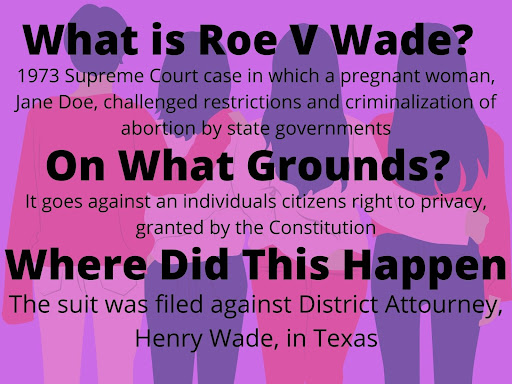What is Roe V. Wade and will it be overturned?

This court case was monumental for feminists involved in the pro choice movement, as it was the first steps to gaining women the right to an abortion.
December 23, 2021
On January 22nd, 1973 the Supreme Court Case Roe V. Wade was passed, advancing the Pro-Choice movement and giving women around the nation the choice and ready access to get an abortion for a variety of private reasons. However, there have been recent discussions about overturning the court case, which would be detrimental to the Pro-Choice Movement.
“I would 100% consider it a part of the feminist movement. I think that removing a woman’s right to choose is inherently devaluing their place in society, and I think the feminist movement is about uplifting women and making sure we are treated as equals, and the right to choose is definitely part of that,” said Siona Mondal (‘22), a student in AP Competition Civics.
Currently, the main opponents of Roe V. Wade are people involved in the pro life movement, arguing against abortion on moral and religious grounds. This has sparked debate between the two groups and brought up questions about women’s’ reproductive rights.
“It has always been a big political issue since the 1970’s, which is odd because abortion wasn’t really an issue until the second part of the 20th century. When it became an issue regarding religion and that those that are highly religious made a connection of being anti abortion, that is when we started seeing more of a divide of pro life and pro choice,” said AP US History teacher Mairi Wolhgemuth.
With the death of Supreme Court Justice Ruth Bader Ginsburg, Justice Amy Coney Barrett was appointed to the Supreme Court leaving the Supreme Court leaning to the right, or conservative side. The Pro-Life Movement has typically been associated with conservative individuals, which has sparked concern for many Pro Choice advocates that they will overturn the court case.
“Part of it is because the Courts themselves have become more politicized. It has become a way for parties to assert their power and dominance, and by doubling down on issues like abortion they are able to get their party bases really riled up, especially their more religious right party bases,” said Mondal.
In addition, legislation at the state level has tried to restrict women’s access to abortion clinics. In Texas, the Heartbeat Act encourages people to turn in their fellow citizens who are having, or assisting, in an abortion that a women is having after six weeks of conception.
“The current law in Texas actually violates that first threshold because it bans a woman’s right to have an abortion after the first six weeks and that is definitely within the first trimester so that is why this is so controversial. Many states have purposely passed these laws to challenge the right to an abortion because they wanted, so they do this on purpose, to go into litigation in order to work up to the Supreme Court,” said Mairi Wohlgemuth.
It is still uncertain whether the Supreme Court will overturn Roe V Wade. While uncommon in US history there have been instances of cases being overturned, like in Plessy V Ferguson with Brown V Board of Education where segregation in schools was deemed unfair, but in contrast one of the main jobs of the Supreme Court is to interpret the law and uphold the laws that have already been established, so it is not clear what the future of this court case will actually be.




